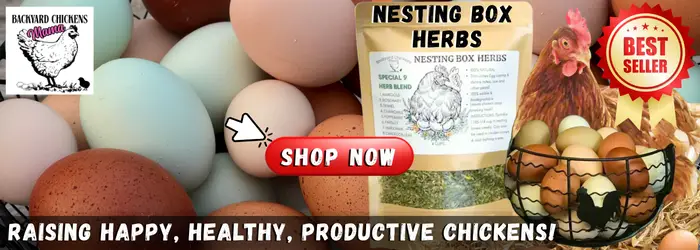
Everybody wants a happy chicken. In order for a chicken to be happy, all of its needs must be met and it must not be experiencing any stress or pain. Happy chickens exhibit their natural “chicken like behavior,” such as preening, perching, roosting, dust bathing, mating, pecking and scratching the ground for food, exploring, regular egg laying, eating and drinking.
The following is a list of 9 important signs that your chickens exhibit to communicate with you that they are happy! If your chickens are not exhibiting even just one of these signs, it can be a signal to you that they are not happy and something needs to be done to change that.
Sometimes it is an easy fix, like removing a barking dog that has been stressing the flock or giving your chickens more space to free range. But other situations, such as illnesses, require some type of medical intervention. The important thing is that you recognize these signs and if your chicken is not exhibiting one or more of them that you address it right away.
# 1 Does Your Chicken Purr?

Yes, happy chickens will purr. It kind of sounds like a higher pitch, throaty vibration and they do this when they are content. I mostly hear them do this if they are nestled down relaxing, especially when they are sunbathing. A mother hen will also purr to her baby chicks before they even hatch! This is one of their first forms of communication.
# 2 Happy Chickens Move About Freely
A chicken that is happy and content will move about freely throughout their coop, run or field. It is important that chickens are given enough space to be able to explore freely and move around. The minimum amount of space a fully grown chicken needs is 10 square feet per chicken. The more, the better. Bantam breeds, you can get away with a little less space.
| #CHICKENS | MINIMUM SPACE NEEDED |
|---|---|
| 2 | 20 SQ FT OR 5′ X 4′ |
| 4 | 40 SQ FT OR 10′ X 4′ |
| 6 | 60 SQ FT OR 10′ X 6′ |
| 8 | 80 SQ FT OR 10′ X 8′ |
| 10 | 100 SQ FT OR 10′ X 10′ |
Chickens that are raised in factories, battery cage chickens, are not allowed to freely move around. Instead, several hens are confined into wire cages for the sole purpose of laying eggs. These hens are unable to even spread their wings fully or perform any natural chicken behaviors. These are NOT happy chickens.
If you see one of your chickens standing in one place for an extended period of time, this is not normal. During the daytime, healthy and happy chickens will move around exhibiting other normal chicken behaviors listed below.

#3 Happy Chickens Preen Throughout the Day
Chickens like to keep their feathers clean and it isn’t uncommon to see groups of chickens preening together. They like doing this! It’s like a social event for them.
Chickens use their feathers to regulate their body temperature, so It is important for them to keep their feathers clean and in tip top shape. Preening helps a chicken to waterproof its feathers and eliminate mites, lice, fleas and other parasites.
FUN FACT ABOUT PREENING
Have you ever wondered why chickens seem to nibble at their tail feathers first before preening their feathers? All chickens have a “preening gland” or urophygial gland at the base of their spine, just after the last vertebrae. It looks like a little pimple!
When a chicken nibbles on this gland it will discharge an oily substance. Chickens take this oily secretion in their beak and spread it over its feathers. This oily secretion helps to deter parasites from hitch hiking on them and also helps to waterproof its feathers!
#4 Frequent Dust Baths is a Must

Watching a chicken take a dust bath for the first time can look quite alarming to most people. The first time seeing this, you may think that something is terribly wrong with it. Chickens will dig a little hole, just large enough to fit into, so they can squirm around in it, kicking up dirt to coat all of its feathers.
Chickens dust bathing is the equivalent to humans taking a shower. When a chicken takes a dust bath, it is coating all of its feathers(all the way down to its skin) with dirt. This is normal, instinctive chicken behavior. When a chicken dust bathes it clogs the breathing pores of parasites, killing them off.
When a chicken is done covering in dust, it will stand up and ruffle its feathers to shake off. (Stand clear if you don’t want to be hit with flying dirt. It’s kind of like a dog shaking off after getting wet!) Then it will continue by preening each individual feather, coating it with the oily substance from its preening gland.
If you notice a chickens’ feathers not looking very healthy, this can be a sign of an unhappy or unhealthy chicken. Keep an eye on them. If you need to, separate it from the rest of the flock and bring it to an area where you can keep a closer eye on them.
#5 Happy Chickens Peck and Scratch the Ground
Happy chickens will instinctively peck and scratch the ground for a variety of reasons.
- Chickens will scratch and peck the ground moving the soil, to forage for food. Long ago, their ancestors had to do this to find food in order to survive. Today, chickens will do this even if they have plenty of food available to them.
- A chicken will scratch the ground or nest to make a comfortable resting area or spot to lay an egg.
- Chickens scratch up dirt to fling it over them while dust bathing.
- Happy chickens will scratch the ground to be social with other flock members. It isn’t uncommon to see a flock of chickens all scratching and pecking in the same area.
#6 Happy Chickens will Perch and Roost at Night
Chickens instinctively seek out the highest places they can to roost at night, so they are less likely to get attacked by a predator. While their day vision is exceptional, their night vision is for the birds! They cannot see in the dark and this makes them more vulnerable, putting them at risk of being attacked by predators at night.
If you notice one of your chickens is not roosting at night and they used to, it can be a sign that they are not feeling well or even possibly has been injured and cannot fly up to roost. Do a full body check, looking for injuries. Sometimes, even “bumblefoot” can cause a chicken not want to roost or perch.
Silkies are an exception to this. Silkies cannot fly and if they are not provided with a place low enough to roost at night, they will be content sleeping in their nesting box or making a little nest in the ground. For safety, it is best to provide a roosting area that Silkies are capable of getting to.
#7 Regular Eating and Drinking
A happy and healthy chicken will eat and drink throughout the day. It can get difficult to monitor this if you have a large flock of chickens. If you notice one of the flock standing off to the side or not scratching, pecking, preening or dust bathing, keep an eye on them to make sure they are eating and drinking regularly.
How Much Feed Does an Adult Chicken Eat?
The average amount of chicken feed that an adult chicken should have is 1/4 lb. of feed per day. This amount can vary, depending upon the breed and if your chickens are allowed to free range, where they have access to leafy greens, seeds and bugs.
How Much Water Does an Adult Chicken Drink?
The average amount of water that an adult chicken drinks is 1 pint per day. This amount can vary greatly depending upon the outdoor temperature and the breed of chicken. Chickens should always have access to an unlimited amount of clean water.
#8 Happy Chickens Lay Eggs Regularly

A happy henhouse is filled with not only happy chickens, but specifically happy hens! Happy hens will provide you with a good supply of eggs.
Chickens begin laying eggs around 5-6 months of age, depending upon the breed. Once they begin laying, happy chickens will often take two breaks to molt. During this time, usually the Spring and Fall, chickens lose some or all of their feathers in order to grow in new feathers. New and healthy feathers help to regulate their body temperature during hot and cold temperatures.
During a molt, chickens can experience some pain when the feathers are growing back in. This does not mean that they are not happy, but it is a good time to provide some high protein treats for them. Chickens need more protein to grow in a healthy set of feathers.

For more information on healthy high protein treats for chickens that you can make, read my article, How to Make High Protein Treats for Molting Chickens.
During molting season, it can look like your flock was attacked by a predator. Feathers will be everywhere! Don’t worry, this is normal and it generally only lasts from 8-16 weeks and the result is a beautiful chicken with healthy, shiny feathers!
Happy hens, that are not molting, will continue to provide you with up to 300+ eggs per year, depending upon the breed. If your laying hen is not molting and has a pale comb and wattle, this can be a sign to you that she is not happy and probably does not feel well.
#9 Happy Chickens Will Sing

A happy hen will sing her “egg song” after laying an egg. She does this to let everyone know that she just laid the most beautiful egg. Many times other flock members will join in on the song with her.
The egg song sounds like a cackling sound, kind of like “bock, bock, bock, bock, bock, bock, baaaaaaak.” It is also thought that hens may do this after laying an egg to ward off predators.
A happy rooster will sing or “crow” as a way of trying to impress a hen. This is a sign of a happy and healthy rooster. If your rooster falls silent, this can be a signal that he is ill.
A sick rooster will stop crowing and put all of his energy into fighting his illness. He also doesn’t want to attract attention to himself during a time that he doesn’t have the energy to defend himself, just in case one of his fellow roosters decides to rearrange the pecking order on him.
CONCLUSION: 9 Important Signs to Look for – Are Your Chickens Happy?
Happy chickens will “purr,” move about freely and preen throughout the day. It isn’t uncommon to see a flock of happy chickens dust bathing, pecking and scratching the ground and perching close together at night.
Happy chickens will eat, drink, poop and lay eggs regularly. And after they lay an egg, they will let the whole world know by signing their best song ever, “the egg song.”








